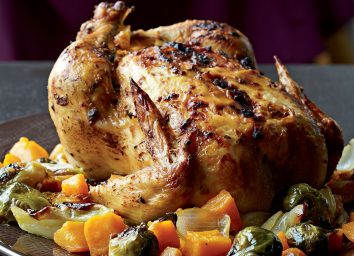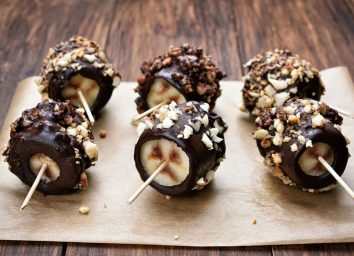11 Probiotic Foods for Gut Health That Aren’t Yogurt
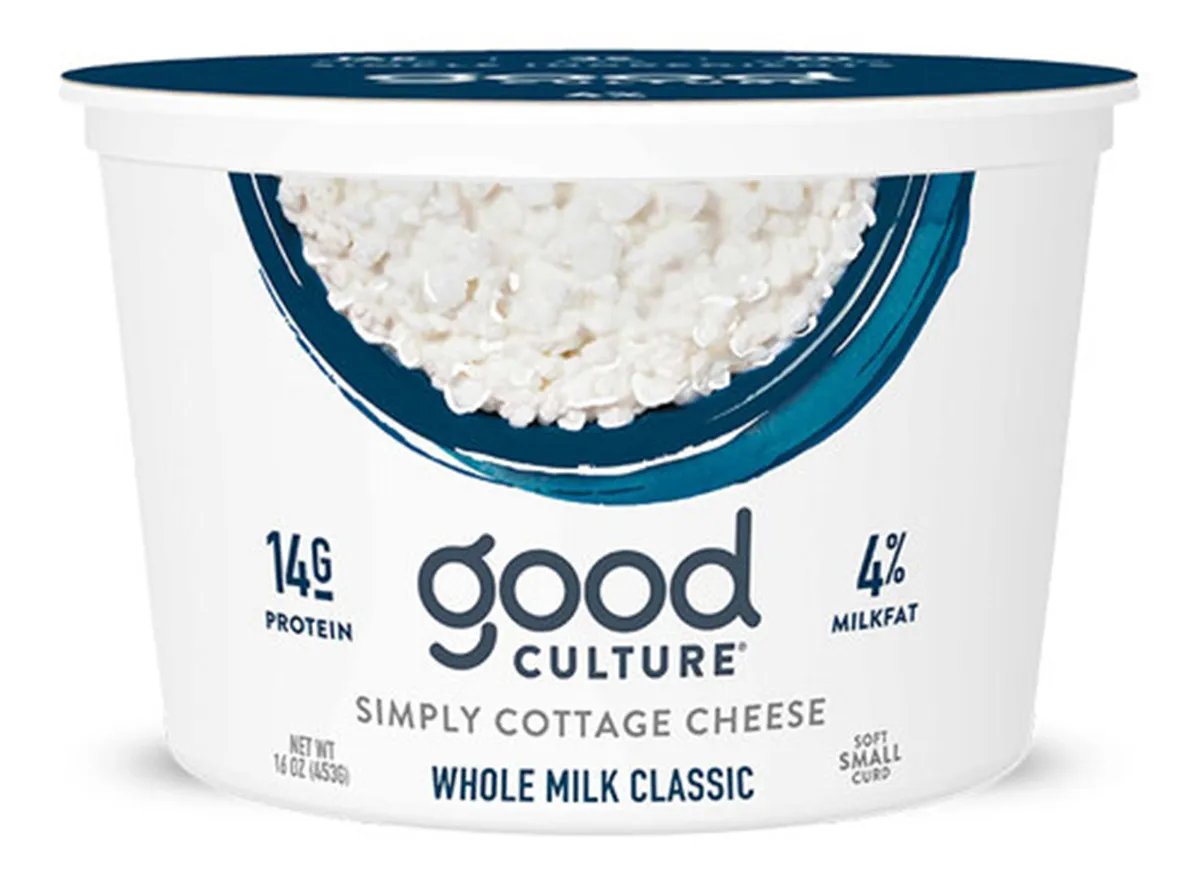
Probiotics are essential for good gut health, and, in fact, these healthful bacteria already naturally exist within the gut. Consuming more probiotics either through supplementation or through diet can further help combat any bad bacteria in the gut that can cause gastrointestinal discomfort and even vaginal infections. But be careful, as consuming too many probiotics can make you feel bloated. While they are most abundant in yogurt products, they also are prevalent in various other food products as well.
Read on to see 11 probiotic products you’ll want to eat that aren’t yogurt.
For your fork and spoon…

We asked a team of nutrition experts what bacteria-infused eats should be on your Eat This! list, and which are better left on the shelf.
Eden Foods Organic Miso Mugi
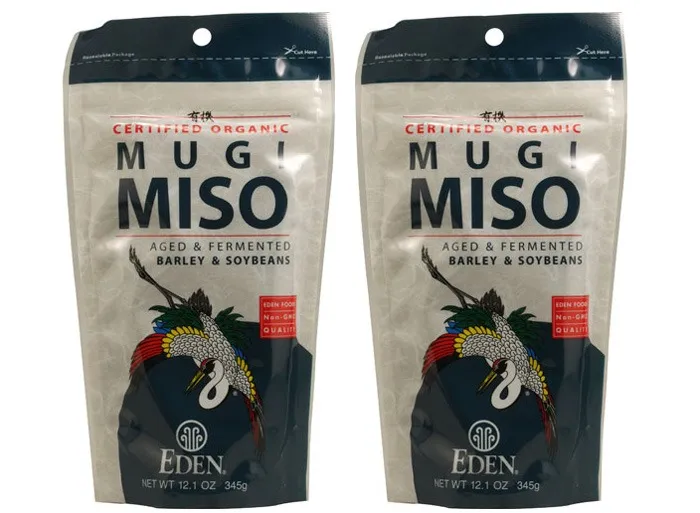
Eden Foods combines soybeans and barley and then puts them through the traditional koji fermentation process to produce a salty and thick miso paste that their customers can’t get enough of. Add the stuff to soups, use it as a seasoning alternative to salt or soy sauce, or roll up your sleeves and use it to make a salad dressing. Simply combine 1 tablespoon sherry vinegar with 3 tablespoons of extra virgin olive oil and 1 scant teaspoon of miso paste in a large bowl. Toss the mixture over a bed of greens, and enjoy. So simple!
The Bottom Line: Miso Mugi is an Eat This! In fact, registered dietitian Lisa Moskovitz says fermented foods like miso are some of the very best sources of probiotics on the planet.
Good Culture Cottage Cheese
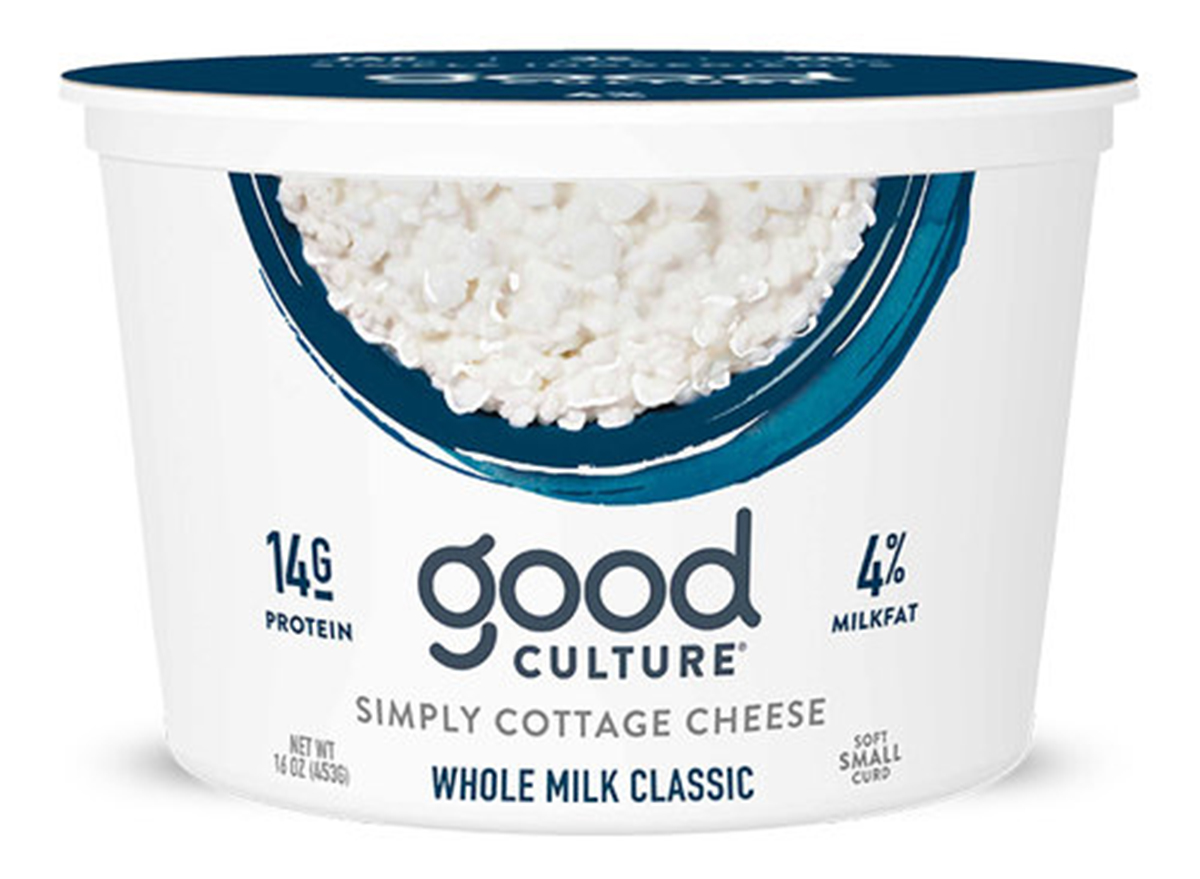
To be clear: Not all cottage cheeses contain probiotics, but Good Culture‘s tubs are packed with live and active cultures, and they come in a variety of sweet flavors like blueberry açaí, strawberry chia, and pineapple. Though dairy products are packed with slow-digesting protein and have been shown to enhance probiotic absorption, that doesn’t make this product a clear cut winner or loser. “Cottage cheese is generally high in sodium—and this line is no different—so people with elevated blood pressure may want to skip it. People who bloat easily and those with lactose intolerance should also pass on it,” advises Sarah Koszyk, MA, RDN, founder of Family. Food. Fiesta.
The Bottom Line: This is definitely healthy enough to be an Eat This!, but don’t make it your go-to source of probiotics unless the rest of your diet is relatively low in salt. (Salt, by the way, is lurking in some surprising places—like these restaurant desserts with more salt than a bag of pretzels!)
Melt Organic Probiotic Buttery Spread
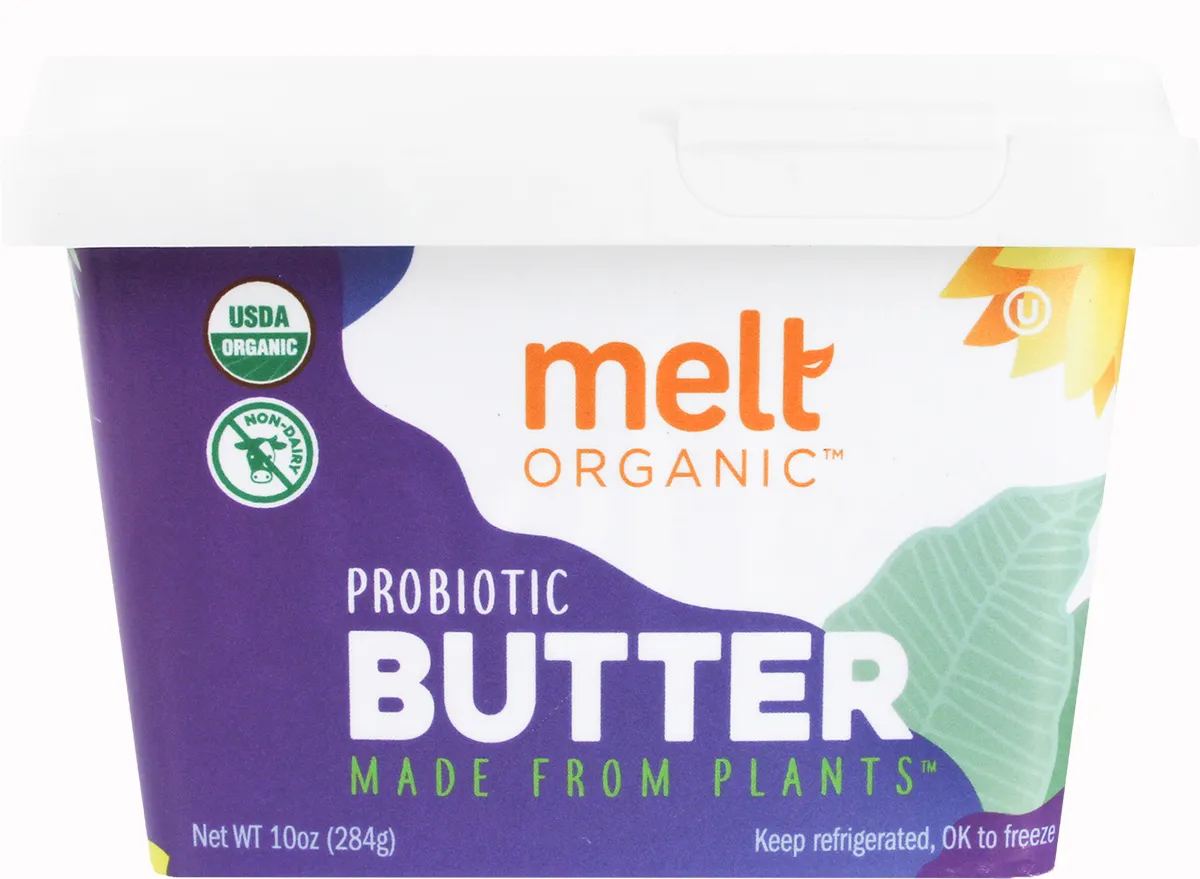
Melt Organic‘s blend of coconut, sunflower, and flaxseed oils is spiked with a patented probiotic called GanedenBC30. The makers of the product claim that the bacteria survives 10 times better in the gut than yogurt cultures, and, in turn, can bolster immunity and digestive health more effectively. “GanedenBC30 contains the probiotic strain, Bacillus coagulans GBI-30, 6086. This strain is different than the standard probiotic strain, Lactobacillus, which is more commonly found in probiotic products,” explains Koszyk. “Some research has suggested GanedenBC30 might increase immune system functions and decrease harmful gut bacteria. However, there is currently not enough research to guarantee specific benefits claims.”
The Bottom Line: Fermented foods like sauerkraut and green olives are likely more potent sources of probiotics than a man-made buttery spread spiked with gut bugs. However, if you’re interested in getting extra probiotics in, Koszyk gives you the green light. “I wouldn’t depend on it as your sole source since there’s no way to know how many of the probiotics are actually making it into your system. That said, it is a source of a less common probiotic, and consuming various strains can only benefit gut health,” she explains.
Enjoy Life Foods Baking Mixes
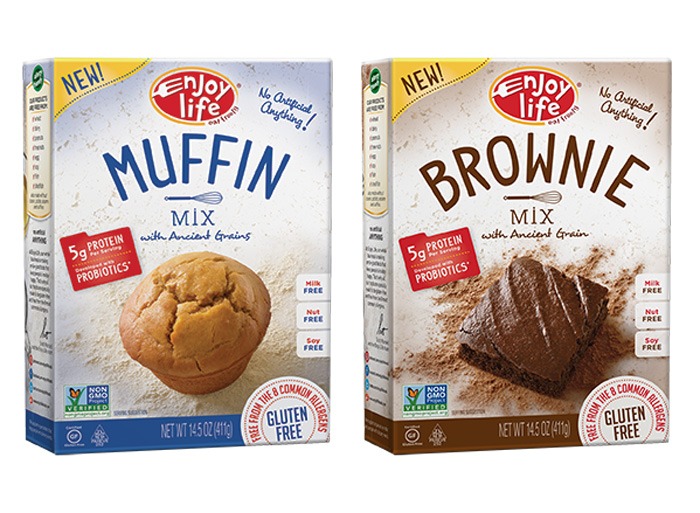
We love that Enjoy Life‘s baking mixes are free of gluten and synthetic ingredients like hydrogenated oils and caramel coloring, but they shouldn’t be your go-to source of probiotics. Sure, they contain the bacteria bacillus coagulans, but the little buggers have very poor resistance to heat. “Probiotics are usually destroyed when cooked at high temperatures, so you’re likely not reaping many of their healthy gut benefits,” explains Moskovitz.
The Bottom Line: If you want brownies or muffins with a clean ingredient profile, go ahead and grab a box. But when it comes to weight loss and gut health, they likely won’t help.
Lifeway Lite Probiotic Farmer Cheese
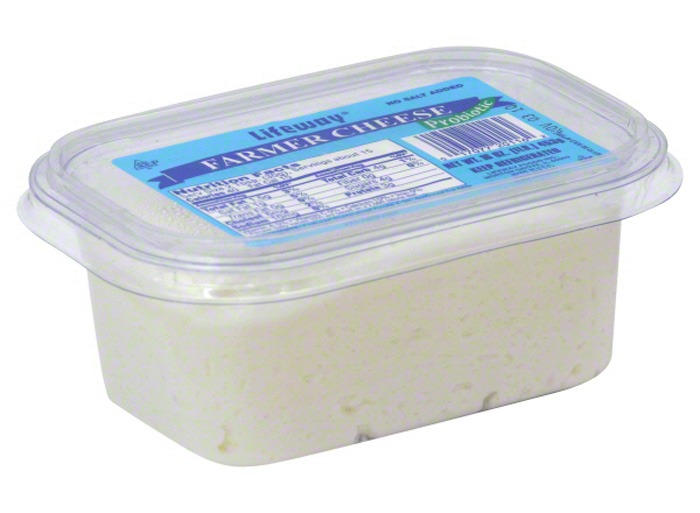
If you’re a lactose-intolerant cheese lover, this kefir-based, crumbly salad-topper may be for you. Kefir, a tangy, sour-tasting drink made from fermented cow’s milk, is 99 percent lactose-free and is packed with probiotics for a happy, healthy belly.
The Bottom Line: This cheese is a go! “This product is minimally processed and is a good source of calcium. Overall, it’s not a bad way to get some probiotics in,” says Koszyk.
Linwoods Ground Flaxseed with Probiotics & Vitamin D
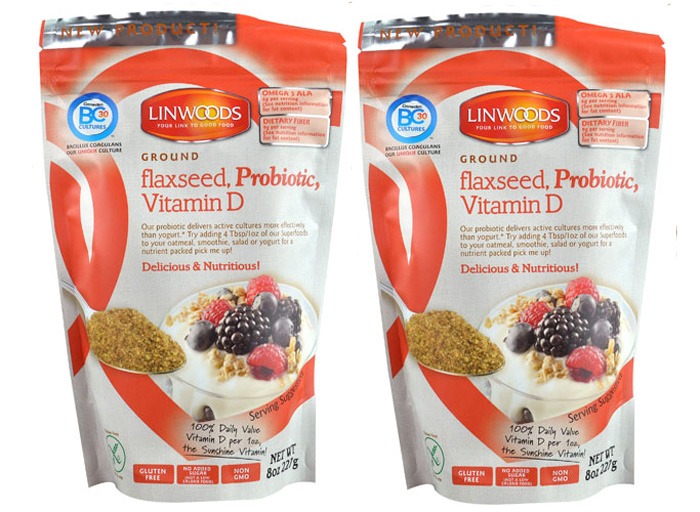
This is yet another product packed with GanedenBC30—and Linwoods is charging an arm and a leg for it. While a typical bag of flax will cost you about $0.42 an ounce, their probiotic variety goes for about $1.25 an ounce, which is more than three times as much!
The Bottom Line: “Be cautious of cost when considering which probiotic foods to buy,” warns Koszyk. “If food makers are charging more for the product because of the added bacteria, it may be a good indicator that it’s more a marketing ploy than a product with many additional benefits.” She suggests you stick to regular ground flax (it makes a great addition to oatmeal, smoothies, and cold cereals) and get your probiotics elsewhere.
Alive & Well Olives
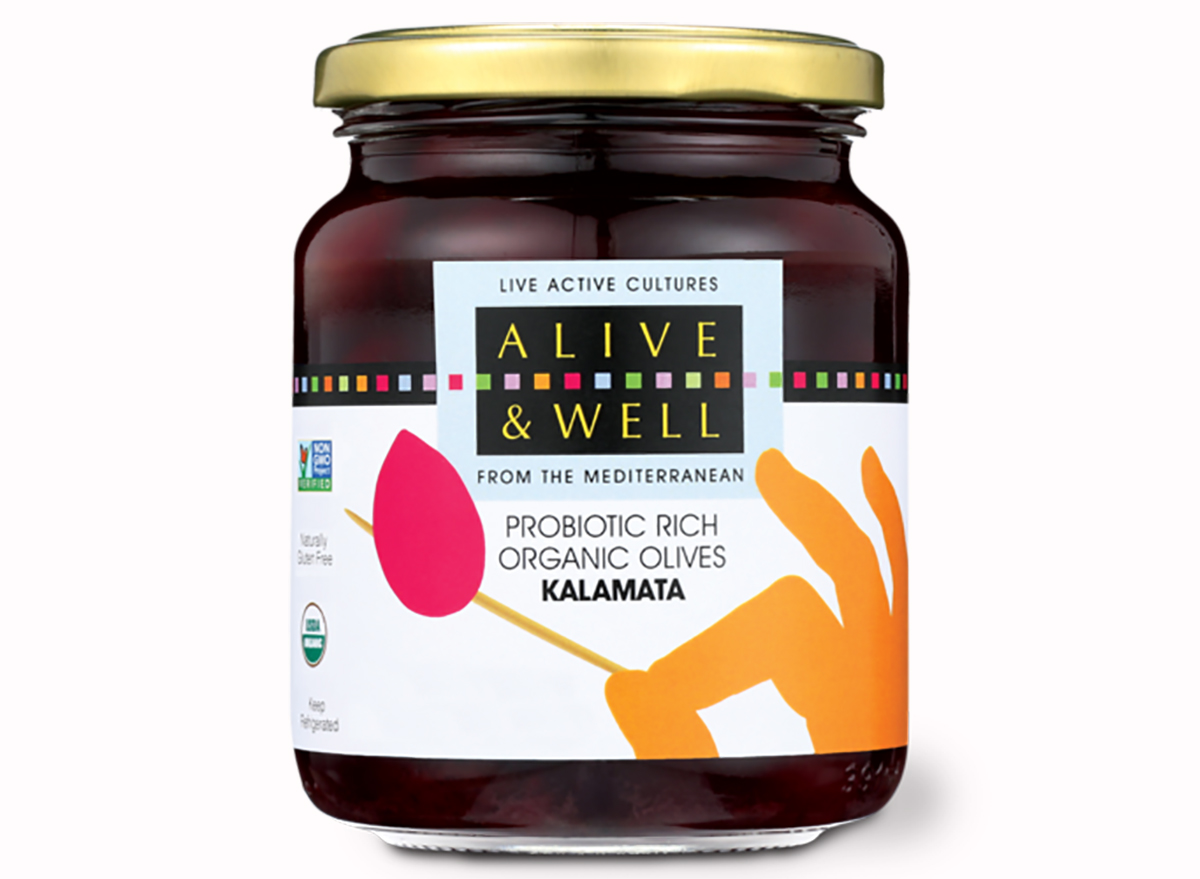
Imagine eating an olive grown from a tree that’s over 1,000 years old and naturally rich in probiotics. Alive & Well is just that. All of their olives are cultivated in Greece, with minimal to no fertilization added and an extensive curating process. Put atop a salad with feta cheese, tomato, and red onion for a true Greek salad.
The Bottom Line: This is a great way to get probiotics in, as well as some healthy fats. But be mindful of the serving size—don’t go over two servings in a day, because just six olives will cost you more than 500 milligrams of sodium. What we love about this product the most though is that there aren’t any weird ingredients added to the mix. The kalamata variety contains organic olives, water, sea salt, and organic red wine vinegar in that order.
For your drinking glass…

Constantly getting your nutrition in while on the go? A number of these trendy sips can help boost your immunity and improve your gut health.
Kevita Sparkling Probiotic Drinks
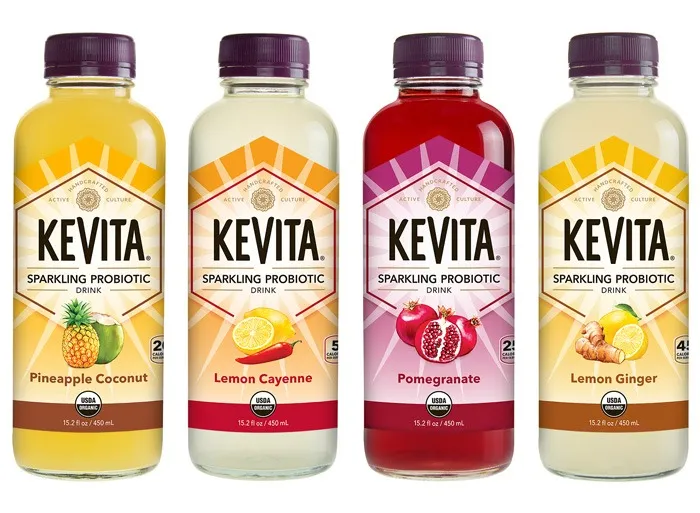
KeVita blends their proprietary probiotic culture blend with flavor enhancers like fruit extracts and coconut water to create their flavorful and refreshing beverages. Chugging an entire bottle will cost you anywhere from 10 to 90 calories and 1 to 5 grams of sugar. (They rely on stevia to keep the counts on the conservative side.) Yeah, it’s better than something like a can of soda, but we’re not sure it’s worth it unless you genuinely enjoy the taste.
The Bottom Line: If you want to give KeVita a try, it certainly won’t hurt you, but it may not really help to improve your intestinal flora, either. Unlike other foods and drinks that contain both probiotics and prebiotics (the food that helps probiotics thrive), there’s no way to tell how much of the bacteria will still be viable by the time it makes it to your kitchen and into your tummy.
Bigelow Lemon Ginger Herb Plus Probiotics Tea
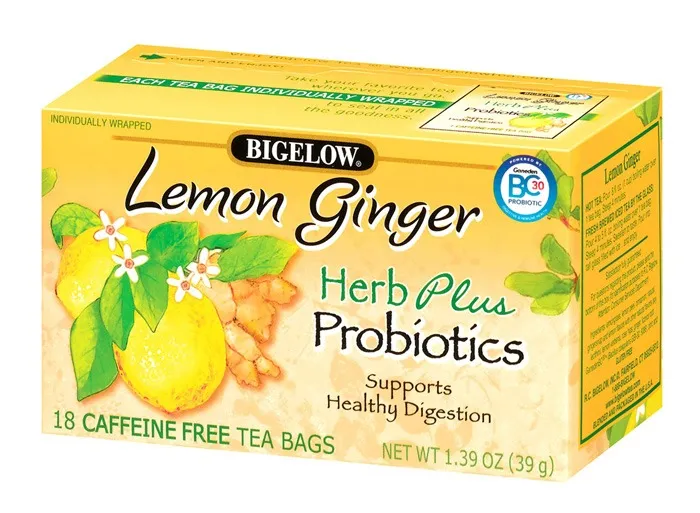
Here at Eat This, Not That! we’re huge fans of all kinds of teas, but we weren’t sure what to think about a tea that’s been packed with probiotics. So, of course, we asked Choi, our resident tea expert, to weigh in: “The effectiveness of probiotic tea is still up for debate. It’s really hard to say how much of the bacteria is still in the tea bag once it makes it into your kitchen—and it’s even harder to determine how much can actually make it down into your stomach.”
The Bottom Line: Give it a try if you’re curious; there’s not much to lose. “To preserve the most probiotics as possible, let the water cool a bit before adding the tea bag to your cup. This will ensure more of the bacteria survive,” explains Choi. She also says to watch steep times and follow the box instructions exactly. “The instructions present the brand’s ideal. Following suit means you’ll have the best chance of the nutrient making it into your system.”
Love Grace Probiotic Smoothie
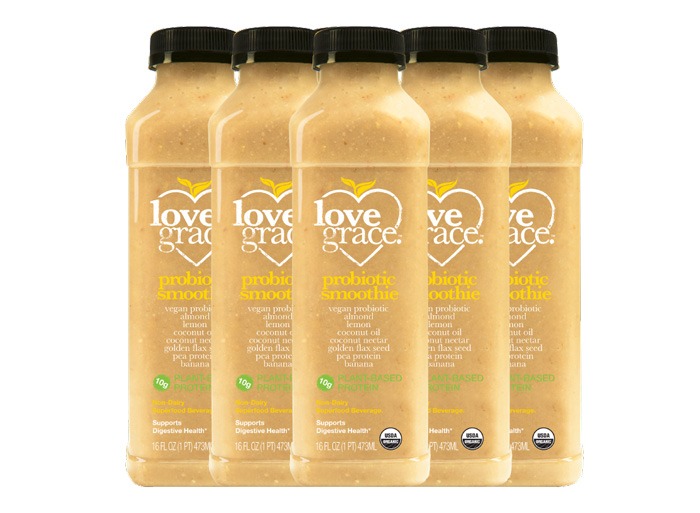
“Love Grace Probiotic Smoothie uses the same strain of probiotics as in the MELT organic butter spread, GanedenBC30,” says Koszyk. “The vegan smoothie contains a good dosage of the probiotic, but every 16-ounce bottle contains 245 calories and 21 grams of carbohydrates from the fruit, so be aware of how much you drink.”
The Bottom Line: Drink this! But split it into two servings if you’re watching your carb intake.
Lifeway Real Fruit Kefir
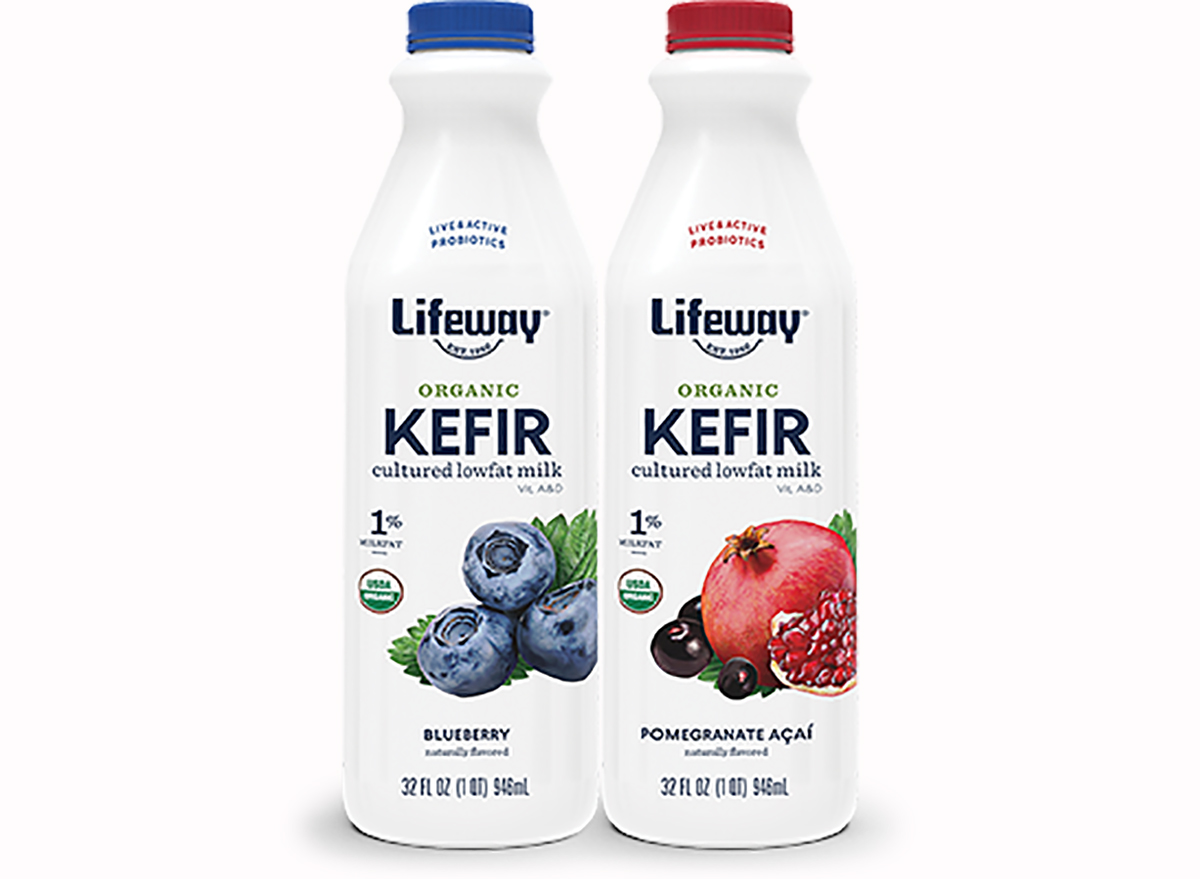
Generally speaking, kefir is an excellent source of probiotics and bone-strengthening calcium, Koszyk tells us. Lifeway’s Real Fruit Kefir is no such exception. “The product contains 12 different probiotic strains and a high dose, too—more than 10 billion,” says Koszyk. Bonus: “Since kefir has fewer milk sugars than regular milk, many people who do not tolerate milk well can sip kefir without an issue.”
The Bottom Line: “This product is a good source of probiotics to improve gut health,” says Koszyk. “In regards to weight management, always try to remember: Calories in drinks count! (Each one has 170 calories and 19 grams of sugar.) You still need to stay mindful of how much you are consuming daily. Use the kefir as a high-protein snack or part of a meal.”

